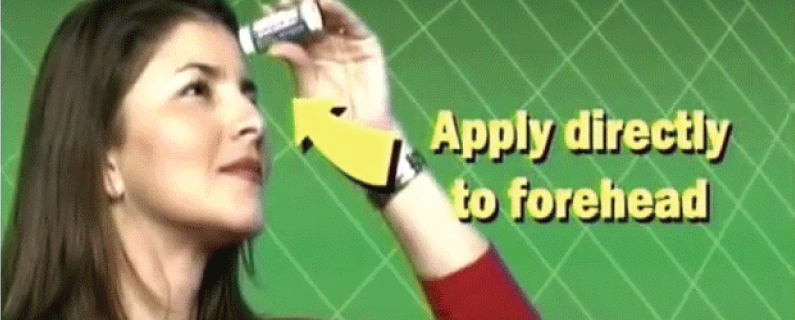 Pop quiz: name the first radio or television commercial that comes to mind.
Pop quiz: name the first radio or television commercial that comes to mind.
Got one?
If you’re like me or my Roundpeg teammates, you thought of one that was annoying and/or repetitive. Intentionally grating commercials have been around for several years, and they’re not likely to go away any time soon. Any idea why not? The numbers suggest that when used in the right context, annoying and repetitive ads tend to be successful. Let’s take a closer look at the how, why and when these awful ads work.
Why it works
Possibly the most well-known annoying ad (and the inspiration for the blog title) is HeadOn, the homeopathic headache relief “medication.” Dan Charron, an executive of HeadOn creator Miralus Healthcare, explained their campaign’s goal:
“It’s all about recall. It’s all about recall.” he stated – even his explanation was repetitive. That focus on recall was a rousing success: HeadOn saw 234% growth in sales in its first year alone. But how did that happen?
Without getting heavily into science of memory, repetitive ads work on a somewhat subconscious level – they trigger parts of our brain that we don’t actively choose to use. The repetitive messaging drills itself into our subconscious and makes a nice cozy home there, our brains deciding that the information is important without consulting us first. If the viewer is annoyed by the ad, even better, as an emotional response such as anger is a huge boon to the ability to recall the message.
Of course, that doesn’t mean that annoyance and repetition is always a good strategy, as we’ll see below.
When it works
You may notice that the examples linked in this blog have been ads for either new or niche products. This is because repetition as a marketing tool has been found to be most effective during the introductory and branding stages of marketing. When introducing a brand to consumers, you have everything to gain and very little to lose, making the double-edged sword of annoyance a great fit. You don’t run the risk of alienating your consumer base, as it doesn’t exist yet anyway. However, the ability to nestle your message into the minds of numerous people is incredibly valuable, and during the early marketing stages, awareness is king.
When it doesn’t
Short answer: most of the time.
Intentionally annoying messaging should never be a long-term gameplan. While some businesses have found success in it, it’s very much a losing strategy for most established brands. You’ll never see a Coca Cola or Apple commercial engage in these strategies, as they’re a zero-sum game for those brands. Even for small businesses, once you have an established base, just as important as gaining prospective consumers is keeping your current ones. If your brand is already in the minds of your consumer base, you run the risk of entering what’s called a “wear-out” phase, where the recipients of your messaging make the conscious decision to disregard and avoid your communication.
The companies that find success in these awful ads are usually acutely aware of their overall marketing strategy, and what part these campaigns play in them.
Maybe you’re not sure which phase of marketing your business is or should be in. If you want to get in tune with your brand’s needs, give us a call and we’ll be glad to help.[su_plan_worksheet]
